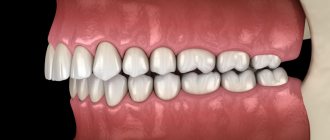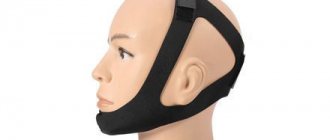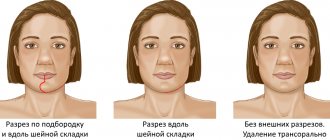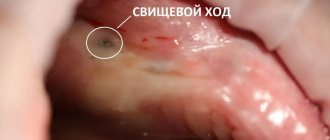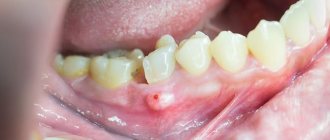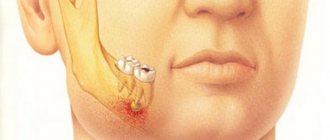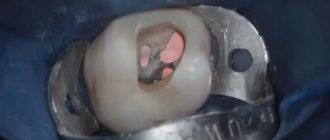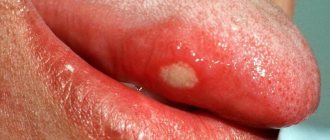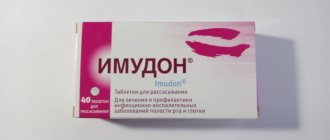1184
In the treatment of Angle class 3 anomalies of the dentofacial system, experts note the effectiveness of the chin sling when it is used in combination with an orthodontic apparatus.
It has been proven that in children who regularly and for a long time use a device for extraoral traction, the proportions of the maxillofacial region change due to resorption of the angle of the movable jaw.
Many orthodontists believe that when used correctly, the device can redirect the growth of the lower jaw and rotate it backwards.
The chin sling is also used for serious jaw injuries (for example, fracture) as a means of immobilization. By pressing the lower jaw, the sling-shaped bandage immobilizes it, providing conditions for bone fusion and preventing displacement of jaw fragments.
General information and purpose
A chin sling for immobilizing jaws during fractures is a first aid remedy that accelerates the healing of the affected joint. It looks like a bandage consisting of a soft and hard part (linings) that are fixed in the chin area.
Ribbons with laces are used as fastening elements, which are attached to the back of the head.
Purpose;
- temporary immobilization of the jaw when delivering the patient to the traumatology department:
- use for medicinal purposes until the bone is completely fused.
In addition, the device is used when it is impossible to provide emergency complex therapy due to the serious condition of the victim. The bandage is applied for 2-3 days or more until a satisfactory condition occurs. In this case, the traumatologist must take into account the possible risks of improper fusion of the fragments.
The chin sling for correcting malocclusion is an extra-oral orthodontic appliance. It is made in the form of a plastic pad or a bandage made of dense fabric. Attaches to the head cap using elastic rubber rings. The tension is adjustable.
Orthodontic appliances are most often used for open, mesial bites in children, excessive growth of the lower jaw and insufficient facial height, which are characterized by the following changes:
- violation of facial aesthetics due to the mesial position of the movable jaw;
- protrusion of the chin area;
- reduction of the lower third of the face;
- retraction of the upper lip with thickening of the lower lip;
- concave profile;
- arrangement of elements of the anterior section in the reverse overlap;
- retrusion of the upper teeth;
- negative changes in the relationship of the dentition.
Remarkable. For mesial occlusion, a sling is used, the thrust of which is beveled posteriorly. With open occlusion, vertical upward traction is advisable.
Why is hardware treatment for malocclusion considered the most effective?
Come here for a closer look at the buttons used in orthodontics.
At this address https://www.vash-dentist.ru/ortodontiya/prikus/impaktnyiy-zub.html we will understand what impact teeth are.
When should you go to the orthodontist?
Our clinic specialists recommend starting bite correction in a timely manner. As for children, you should visit the orthodontist after baby teeth have erupted. It is necessary to show the child at 6 - 8 years old, since at this age some anomalies may already be noticeable. Parents must remember that the responsibility for the proper development of the chewing apparatus in children lies on their shoulders. With regular monitoring by a doctor, you will be able to react in time, avoiding deviations. Otherwise, it will be more difficult to solve this problem.
The main method of treating dentofacial disorders is hardware. A huge number of orthodontic devices have been developed that bear the name of their authors (Schwartz, ALF, Brückl-Reichenbach, Biedermann, Persin, Haas, Klammt, trainers).
An adult's bite can be corrected with the help of an orthodontist. A big plus is that there are no age restrictions for this method. They can be installed even on pensioners. It all depends on whether there are any contraindications (bleeding gums, inflammation, stones, caries).
Modern orthodontics uses structures that provide high-quality correction of the most complex defects without aesthetic discomfort.
The bite is essentially determined by the relationship between the lines of the teeth; its appearance is determined when the jaws are completely closed.
The main causes of malocclusion
Most malocclusions are of genetic origin and are observed in members of the same family:
- too small or too large distance between teeth;
- imbalance between the shape and size of the jaws;
- extra or missing teeth;
- short frenulum of the lips and tongue.
Principle of action in the treatment of bite
To eliminate these problems during the period of primary occlusion, orthodontists resort to preventive methods, the basis of which is to prevent the formation of persistent deformities.
Effective treatment results are achieved using an integrated approach , combining general health procedures with local methods of influencing problem areas.
With mesial occlusion and excessive growth of the lower jaw, the fight against pathology consists of limiting further development of the joint. Also during therapy, it is important to force the upper jaw to develop by releasing the bite.
The bite is raised with raising crowns, removable mouthguards supported on the molars of a temporary set and other special structures, for example, an inclined plane appliance.
To limit the growth of the movable jaw, the child is prescribed to wear a chin sling fixed to the cap using rubber rods. The product can be worn at night or at a convenient time during the day.
Doctors recommend making not a single cap, but two wide strips, sewn together and covering the back of the head from ear to ear. When wearing a one-piece product, the child may become hot, especially during sleep.
For the same purposes, it is better to use a sling with holes, and so that the device does not put pressure on the chin, it is advisable to use a cotton pad.
According to patient reviews, the fabric sling is the most convenient. During the treatment process, it is important to monitor the direction of the rubber traction and the force it generates.
Important! The product may force the mouth to open. To eliminate the deficiency, the traction force must be reduced and the direction changed.
The concept of mesial progeny
In the case of mesial progeny, the localization of the correct position of the teeth is disrupted. With the disease, the jaw has a disproportionate structure. Therefore, the facial bone, located below, extends forward relative to the upper jaw. The incisors located at the top overlap the lower ones. A sagittal gap is created - a space located between the lower sections of the incisors located on both jaws.
Varieties
The slings used in maxillofacial traumatology and orthodontic treatment are different. Below we will look at existing types and methods of applying them.
Simple
Used to block the displacement of bone fragments during jaw fractures. You can use a wide gauze bandage.
Application method: the bandage is wrapped in a circle from chin to chin through the crown in four layers, bypassing the ears in front and behind.
Such a bandage quickly loses its fixing properties , slips, and requires constant correction, so experts advise replacing the gauze with an elastic bandage, which is used without tension.
Parietomental according to Hippocrates
A more reliable option compared to the previous version. Such a sling is an indispensable assistant in maxillofacial traumatology, helping to ensure reliable immobilization for fractures of the upper or lower jaw.
Does not require replacement within 2-3 days.
Application method:
- along the frontal part, covering the back of the head, the bandage is wrapped around the circumference of the skull in three layers;
- further along the occipital part transitions (2-3) are made to the parietal-mental zones, bypassing the outer parts of the ear on both sides;
- The procedure is completed by moving again to the scalp along the back surface of the cervical region, moving to the forehead, and then the back of the head.
An important feature of the Hippocratic bandage is that in case of a fracture of the lower part of the facial skull, it should support the jaw, and not tightly fix it . If the integrity of the upper jaw bone is damaged, tight bandaging is performed to prevent injury to surrounding structures.
In the video, watch how the parietomental sling is applied.
Standard
A rigid bandage is used for immobilization during transport of patients with impaired integrity of the jaw bones. Consists of the following elements:
- standard elastic bandage (can be made in the form of a cap);
- hard sling for the chin area with holes;
- oblong triangular protrusions for attaching elastic rings, the tongue of an injured patient and the free exit of ichor, blood and other wound fluid;
- loops of rubber tubes on the cap, which make it possible to securely fasten elastic rings.
To avoid excessive pressure on the soft structures of the face, the traumatologist places cotton pads in the space under the loops. The cap is placed on the scalp.
The tightness of its fit is regulated by a cord, which, after correcting the size, is tied on the patient’s forehead. If the depth of the product is too large for the victim, a soft cushion is placed in the parietal area.
The hard part of the device is also filled with soft material, such as cotton wool or gauze. The fragments are fixed by pressing the dental units of the movable jaw to the elements of the upper row with elastic rings placed on elongated triangular protrusions.
Soft
The soft chin sling by Pomarantseva-Urbanskaya has a base - a fabric pad for the chin with fixed elastic bands on the sides. Elastic elements merge into fabric bands with holes for lacing.
By adjusting the length of the lace at its exit from the last hole, similar to tightening a corset, the sling is tightly fixed in accordance with the size of the head.
Patients and doctors note the ease of use of this variety and the possibility of reuse after washing.
With a head cap
A chin sling in the form of a plastic mouthguard or a lining made of dense material is used in orthodontic practice to create extraoral traction . The mouthguard is fixed to the head cap using rubber rings that have sufficient elasticity.
You can make a head cap with your own hands from dense material or non-elastic tape, which ensures longitudinal and transverse rigidity.
The result of treatment with this product depends on the dosage, intensity and duration of pressure on the problem area, the condition of the bone tissue and their plastic ability.
Application technique at home
To make an orthodontic chin sling, you need to take a dense piece of fabric in the form of a tape of sufficient length (about 80 cm) and width (7 cm).
Divide the tape into two strips from two edges, not reaching the middle by 20 cm. That is, in the end you should get 4 free ends connected to each other by a fabric “island” in the center.
Overlay algorithm:
- Stand facing the person assigned to carry the sling. At the same time, his head should be directed straight.
- Place a soft napkin and then a fabric “island” on your chin.
- Tie the upper free ends at the back of the cervical region, bring the lower ones out and fix them on the top of the head.
- The fixation should not be strong in order to eliminate the risk of breathing problems and discomfort.
The considered method is a simplified option for restraining the growth of the lower jaw in a child, which can be used by any parent without medical assistance.
More professional assistance is provided by an orthodontist. Based on a cast of the jaw, he will individually produce an extraoral apparatus that corresponds to the characteristics of the dentofacial system.
You can also purchase a ready-made product in standard sizes at specialized retail outlets.
How much time is allocated for the retention period of orthodontic treatment and what does it depend on?
In this publication we will look at methods for making individual spoons.
Here https://www.vash-dentist.ru/ortodontiya/prikus/zubov-kak-proverit.html is all about how to check your teeth bite yourself.
Time and duration of wearing
Clinical observations have shown that when treating Angle class 3 malocclusions exclusively with a chin sling, small patients experience a slight delay in the growth of the body and branches of the lower jaw.
After stopping the use of the device, a partial relapse occurs - the jaw moves forward again, i.e., assumes a pathological position. It follows from this that the growth retardation of the movable jaw occurs only under the influence of the bandage.
Considering this feature, doctors have come to the conclusion that it is important to eliminate the anomaly during the period of temporary occlusion. In this case, the use of the sling should be dosed, regular and long-term - at least 12 hours a day for 3-4 years.
To eliminate the defect faster, an integrated approach is required. Intraoral structure + extraoral apparatus + myogymnastics and other auxiliary measures.
Caring for the product is easy. It is enough to rinse the product in soapy water and dry it. The plastic mouthguard can be washed with soap or treated with a disinfectant.
Extraoral devices for treatment of jaw fractures
Correction of a jaw fracture, which is treated extraorally, is carried out by two main devices:
- Static devices. These devices are indicated for fixation of linear and comminuted fractures of the mandible. The device has special bone clamps that are designed to fix bone fragments.
- Dynamic devices. In such cases, the patient is fitted with two knitting needles, which are connected by an external compression arc.
Extraoral dynamic device for fixation of bone fragments
Price issue
To restrain the lower jaw with a homemade bandage made from gauze or elastic bandage, you will have to spend from 30 to 200 rubles at the pharmacy.
Professional finished products will cost more:
- a universal type of chin sling for orthodontic treatment or immobilization for a fracture – 2,800 rubles;
- device with a head cap (depending on the manufacturer) - from 1,500 to 5,000 rubles.
When treating with the constant participation of an orthodontist, it is important to take into account the costs of the doctor’s share, diagnostics, preparatory procedures, additional or basic orthodontic devices and other necessary procedures.
The approximate cost of the entire correction process, without including the price of the product itself, varies between 8-35 thousand rubles. The exact amount will be announced by a specialist after consultation and a hardware assessment of the clinical picture.
Price
The cost of correcting the bite will depend on the severity of the primary anomaly and the type of equipment assigned to be worn. It should be noted that orthodontic treatment is a process in which not only the movement of teeth and the alignment of rows occurs, but also the restructuring of the maxillofacial apparatus, and this may require various methods of intervention and types of devices.
A detailed estimate is drawn up only after inspection; we suggest that you familiarize yourself with the prices for the main items.
| Service | Price |
| Orthodontist consultation | 700 rub. |
| Orthodontic diagnostics (without cost of models) | 3,300 rub. |
| Repeated extended consultation based on diagnostic results | 1,500 rub. |
| Preventative examination by an orthodontist | 500 rub. |
| Activation of braces on 1 jaw without replacing arches | 2,100 rub. |
| Activation of a ceramic bracket system for 1 jaw with replacement of the arch (without the cost of the arch) | 2,400 rub. |
| Activation of a metal brace system for 1 jaw with replacement of the arch (without the cost of the arch) | 2,100 rub. |
| Activation of double-jaw equipment | 2,000 rub. |
| Activation of single-jaw apparatus | 1,000 rub. |
| Replacement of the arc (without the cost of the arc) | 500 rub. |
| Manufacturing and fitting of a Derichsweiler screw (without the cost of the screw) | 9,000 rub. |
| Treatment with aligners (myobrace, trainer-system, Brucsogard) (without the cost of aligners) | 7,000 rub. |
| Treatment on a face mask (without the cost of the mask) | 12,500 rub. |
| Treatment using the INVISIALIGN full system (without system cost) | 150,000 rub. |
| Treatment using the INVISIALIGN light system (without system cost) | 120,000 rub. |
| Treatment with the Star smile kinder system for 4 months (without system cost) | 31,000 rub. |
| Treatment with the Star smile kinder system for 7 months (without system cost) | 45,000 rub. |
| Treatment using the Starsmile full system (without system cost) | 96,000 rub. |
| Treatment using the Starsmile light system (without system cost) | 55,000 rub. |
| Treatment using the Starsmile system, correction of the position of 1 tooth (without the cost of the system) | 15,000 rub. |
| Treatment using the Starsmile system for correction of relapse (without the cost of the system) | 31,000 rub. |
| Orthodontic preparation for prosthetics (without the cost of locks, arches, bands, springs) | 8,000 rub. |
| Microimplant repositioning (without microimplant cost) | 2,000 rub. |
| Removing the bracket system from one jaw | 2,500 rub. |
| Removing a fixed retainer (one tooth) | 400 rub. |
| Taking impressions and casting a model (1 jaw) (without model cost) | 1,200 rub. |
| Removal of aesthetic (ceramic, sapphire) bracket system from one jaw | 4,000 rub. |
| Installation of the Pendulum device (without the cost of the device) | 8,200 rub. |
| Installation of the RME device (without the cost of the device) | 11,000 rub. |
| Installation of a Twin-block device with one screw (without the cost of the device) | 18,000 rub. |
| Installation of the Bioblok device (without the cost of the device) | 11,500 rub. |
| Installation of the Klammt apparatus (without the cost of the apparatus) | 13,000 rub. |
| Installation of the Frenkel apparatus (without the cost of the apparatus) | 13,000 rub. |
| Installation of early treatment braces (2x4) (without the cost of braces) | 14,800 rub. |
| Installing the seat holder (without holder) | 2,000 rub. |
| Installation of additional elements (without the cost of elements) | 1,000 rub. |
| Installing a face mask | 2,000 rub. |
| Installation of orthodontic equipment (double-jaw) (without the cost of equipment) | 10,000 rub. |
| Installation of orthodontic equipment (single-jaw) (without the cost of equipment) | 10,700 rub. |
| Installing a clear removable retainer (without retainer) | 3,400 rub. |
| Installation of a preventive removable prosthesis (without the cost of the prosthesis) | 8,000 rub. |
| Installing a spring on a bracket system (without the cost of the spring) | 900 rub. |
| Installing a spring on a microimplant (without spring cost) | 2,200 rub. |
| Torque spring installation (without spring cost) | 1,000 rub. |
| Fixation (reposition) of 1 bracket without replacing it | 1,200 rub. |
| Fixation (reposition) of the Damon Clear ceramic bracket with its replacement (without the cost of the bracket) | 1,400 rub. |
| Fixation (reposition) of the Damon Q metal bracket with its replacement (without the cost of the bracket) | 1,000 rub. |
| Fixation (reposition) of a metal bracket with its replacement (without the cost of the brace) | 1,500 rub. |
| Fixation of the Damon clear ceramic partial bracket system on one jaw (without the cost of the bracket system) | RUB 25,500 |
| Fixation of a metal Damon brace system on one jaw (without the cost of the brace system) | RUB 33,150 |
| Fixation of a metal brace system on one jaw master, mini diamond (without the cost of the brace system) | RUB 20,600 |
| Fixation of a non-removable retainer on one jaw | 5,000 rub. |
| Fixation of self-ligating ceramic bracket system Empower Clear, Quick Clear on one jaw (without the cost of the bracket system) | 36,000 rub. |
| Fixation of a self-ligating bracket system on one jaw clip sl (Damon copybook) (without the cost of the bracket system) | RUB 29,300 |
| Fixation of partial metal braces Damon Q (one jaw) (without the cost of the braces) | RUB 25,300 |
| Fixation of the aesthetic Damon brace system on one jaw (without the cost of the brace system) | RUB 33,150 |
| Fixation of the Radiance aesthetic brace system on one jaw (without the cost of the brace system) | RUB 34,500 |
| Cementation of a fixed appliance (2 rings) | 1,000 rub. |
Reviews
A chin sling during orthodontic treatment during the primary and mixed dentition period promotes the correct formation of dentition and jaws, which in the future will help maintain facial aesthetics and the health of the dental system.
And your child was prescribed to carry a sling. If yes, we ask you to share your personal experience of wearing the device with our readers. Share its advantages, disadvantages and effectiveness in the comments below.
If you find an error, please select a piece of text and press Ctrl+Enter.
Tags: bite correction
Did you like the article? stay tuned
Previous article
Etiology of hypercementosis and ways to eliminate the problem
Next article
Diagnostic complex Florida Probe - an advanced method of periodontal examination
